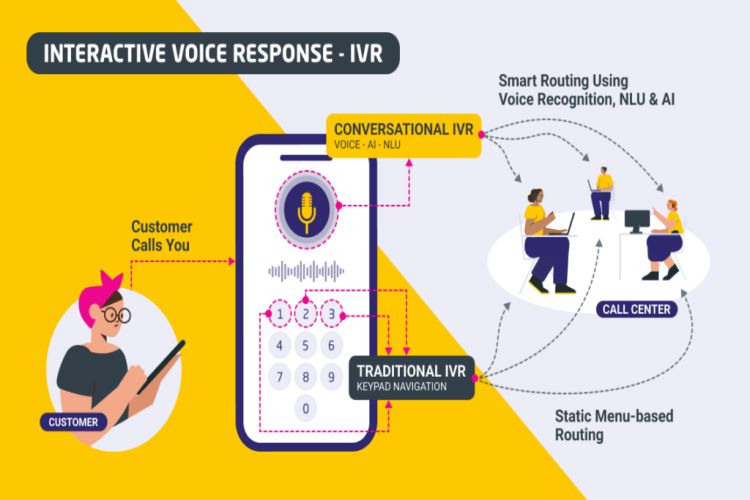 In today’s fast-paced business environment, achieving efficiency is often the linchpin of success. Recently, Interactive Voice Response (IVR) systems have emerged as potent tools for refining communication and bolstering operational effectiveness. With ongoing technological advancements, businesses increasingly turn to IVR to navigate the intricate landscape of customer interactions and internal processes.
In today’s fast-paced business environment, achieving efficiency is often the linchpin of success. Recently, Interactive Voice Response (IVR) systems have emerged as potent tools for refining communication and bolstering operational effectiveness. With ongoing technological advancements, businesses increasingly turn to IVR to navigate the intricate landscape of customer interactions and internal processes.
Table of Contents
Understanding IVR
Interactive Voice Response (IVR) is a cutting-edge technology facilitating seamless computer-human interaction through voice and DTMF tones via keypad inputs. Widely integrated into telephone systems for customer service, information retrieval, and call routing, IVR systems efficiently handle substantial call volumes, reducing reliance on human intervention for routine tasks.
Its dynamic capabilities empower businesses to provide prompt, automated solutions, fostering a more streamlined and responsive communication process. This technology’s versatility extends beyond mere task automation, offering a sophisticated means of engagement that adapts to the evolving demands of modern businesses.
Streamlining Customer Service
In customer service, the primary application of IVR lies in its ability to streamline interactions. By implementing an IVR system, businesses can automate initial customer interactions, allowing callers to navigate options and obtain information without human assistance.
This not only conserves clients’ time but also facilitates a more effective utilization of human resources. For instance, a banking IVR system, leveraging IVR API or Interactive Voice Response Application Programming Interface, empowers customers to check balances or report a lost card without speaking to a representative.
This self-service functionality enhances the customer experience, reducing the workload on agents. Interactive Voice Response Application Programming Interface facilitates seamless integration of IVR functionalities into various business processes.
Enhancing Internal Communication
Beyond customer interactions, IVR systems prove valuable in streamlining internal communication within organizations. Employees can use IVR to access information like company policies, HR updates, leave balances, and training materials, fostering a more efficient and productive work environment.
This self-service approach not only reduces the burden on internal support teams but also encourages a culture of self-reliance and continuous learning among employees, contributing to a more dynamic and adaptive workplace. It empowers staff to stay informed and engaged, enhancing overall organizational agility and responsiveness to evolving industry trends and challenges.
Appointment Scheduling and Reminders
IVR systems are invaluable in industries where appointment scheduling and reminders are crucial. Healthcare providers, for instance, utilize IVR to allow patients to conveniently schedule appointments, receive timely reminders about upcoming visits, and even provide essential pre-appointment instructions.
This not only reduces the workload on administrative staff but also significantly minimizes the occurrence of appointment no-shows, leading to enhanced overall efficiency and improved patient care within healthcare practices. The seamless integration of IVR technology in healthcare operations underscores its transformative impact on optimizing processes and elevating the quality of patient services.
Personalized Customer Engagement
Modern IVR systems incorporate sophisticated features, such as cutting-edge speech recognition and seamless integration with customer databases. This empowers businesses to craft highly personalized and context-aware interactions.
For example, in a retail setting, an IVR system can intelligently identify a customer by their phone number, offer real-time order status updates, and recommend complementary products based on the individual’s past purchases. By providing unique and relevant experiences, this level of personalization improves consumer satisfaction and increases sales and loyalty.
Challenges and Considerations
Despite the numerous benefits IVR systems offer, thoughtful implementation is crucial. Ineffectively designed IVR systems have the potential to cause customer frustration and contribute to a negative organizational image.
Achieving an excellent user experience necessitates finding the right equilibrium between automation and human interaction. Additionally, prioritizing accessibility is imperative. IVR systems should be designed with inclusivity in mind, ensuring individuals with disabilities can easily navigate and utilize the system.
A more user-friendly experience is enhanced with clear and concise voice instructions, as well as the opportunity to interact with a live agent when necessary.
Conclusion
In the pursuit of operational efficiency, businesses increasingly leverage Interactive Voice Response systems. The practical applications of IVR range from improving customer service to optimizing corporate communication. As technology advances, IVR systems will play an even larger role in determining how organizations deal with customers and manage internal procedures. Thoughtfully implemented and focused on user experience, IVR becomes an invaluable tool for navigating the complexities of modern business operations.





